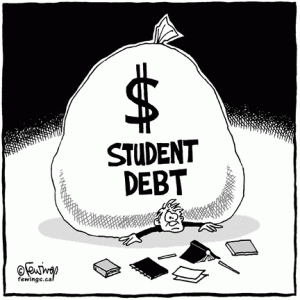I taught a research-writing class last year called "College!" where students took on research subjects related to higher education. My focus was on the privatization of public education, and among the readings we discussed was Tad Friend's "Protest Studies," about the Berkeley student unrest following major budget cuts in California. I was frankly disheartened, though, by the large number of students who were not asking if we as a society should invest more in public education but instead asking the question, "Is College worth it?" Of course, they meant "is it worth the investment" for the individual, in strictly economic terms. And, from an individual perspective, it might feel like a reasonable question, especially considering that most of them have already gone into debt and have to consider accrued interest in paying back their loans, the high cost of tuition, and the four years of lost wages in making the calculation.
Those who asked "Is College worth it?" did not recognize, however, that the question itself arises out of the privatization of higher education: students now look at the degree purely as an economic benefit to the private individual, something that adds to the graduate's earning power -- on average "about $1 million in a lifetime" (which has been the claim since the Reagan years and confirmed recently, including in The New York Times following Pew Research and by more recent studies; of course, it depends on your degree; and you do have to wait well over a decade after graduation before you catch up with the earnings of your peers who became UPS drivers right out of high school.)
Those who asked "Is College worth it?" did not recognize, however, that the question itself arises out of the privatization of higher education: students now look at the degree purely as an economic benefit to the private individual, something that adds to the graduate's earning power -- on average "about $1 million in a lifetime" (which has been the claim since the Reagan years and confirmed recently, including in The New York Times following Pew Research and by more recent studies; of course, it depends on your degree; and you do have to wait well over a decade after graduation before you catch up with the earnings of your peers who became UPS drivers right out of high school.)
Is college worth it? According to NPR, this question gets asked every time there is a recession and individuals become debt averse. But even from an individual perspective, almost all of us with college degrees can easily answer, "yes." As the author of "Yes, College Is Worth It" (from Confessions of a Community College Dean) relates, few individual graduates would ever surrender their college degrees (and everything associated with that degree), so the easy answer is "Of course college is worth it." And as the Lumina Foundation, the Obama administration, and the Gates Foundation will tell you at great length, it is imperative for our society to get more people to choose college and to graduate. It is not about the individual alone, and it has to be a social commitment to make it happen.
So who is encouraging young people to think that skipping college might be a better option? Who wants us to be asking, "Is college worth it?" Who doesn't want kids going to college? And who is supporting talk of a "college bubble"? (talk recently debunked quite forcefully in an article titled "What bubble?")
Or is it just that we find it so difficult to think outside of the language of privatization, that the question just comes to us naturally? We as a society are now unwilling to help foot the bill, so the cost of college falls to the individual student -- or, as in the cartoon above, it falls on the individual student as his or her private debt. Privatization at its best.
Is college worth it? That's not the right question. A better question is: Can we, as a nation, afford not to send our high school graduates to college?
Or is it just that we find it so difficult to think outside of the language of privatization, that the question just comes to us naturally? We as a society are now unwilling to help foot the bill, so the cost of college falls to the individual student -- or, as in the cartoon above, it falls on the individual student as his or her private debt. Privatization at its best.
Is college worth it? That's not the right question. A better question is: Can we, as a nation, afford not to send our high school graduates to college?
